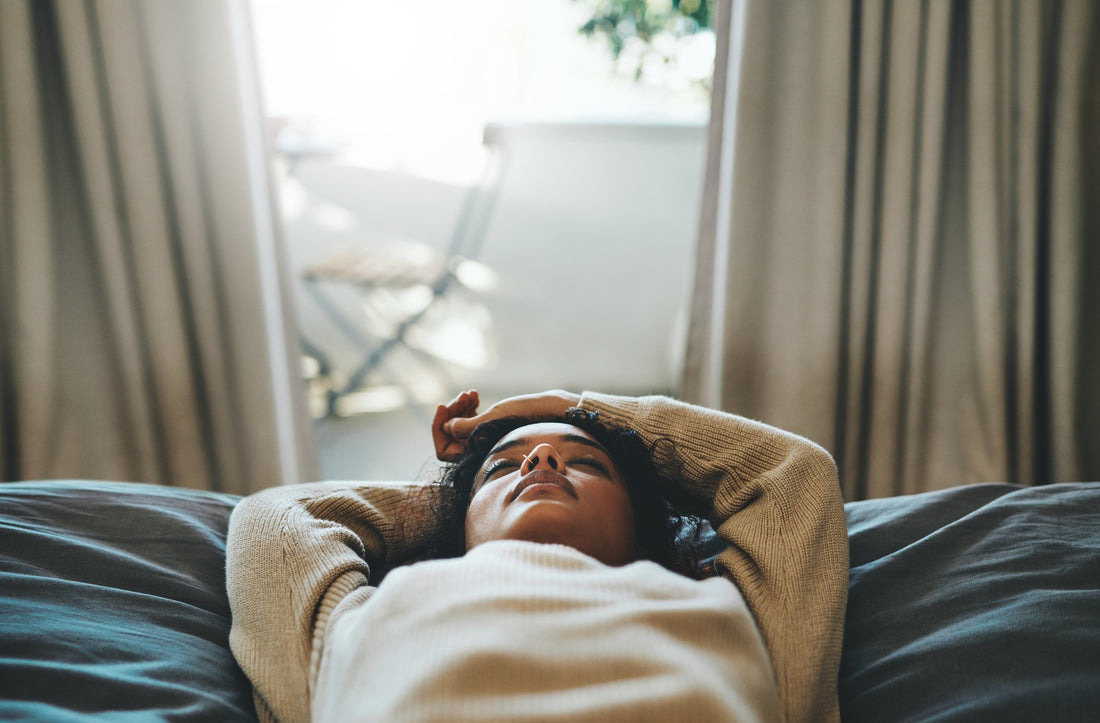Read on for our guide on how to sleep with a stuffy nose, including finding the cause of your stuffy nose and how to treat the condition for a more restful night's sleep.
What Causes a Stuffy Nose? Proven Reasons Behind Congestion
If you find yourself with a stuffy nose, you need to find the underlying cause. Finding the root cause of your stuffy nose will help you treat it and find the best solution to clear your sinuses and decrease nasal congestion.The condition of nasal congestion is called rhinitis, and rhinitis can be triggered by many other conditions, both allergic and non-allergic.
Allergy Season
Allergic rhinitis affects between 10 and 30% of adults, so allergies could likely cause your stuffy nose. Allergy season can bring severe discomfort for many allergy sufferers, and you may suffer from a runny nose or blocked sinuses. Other allergens can also cause allergic nasal congestion, such as dust mites and pet hair. If your bedding has dust mites, this will increase your likelihood of becoming congested at night.Flu
The flu can often cause congestion. You could experience a sore throat. The congestion caused by the flu is your body's natural way of removing bacteria from your nasal cavity and should pass once your body has fought off the illness. If your body temperature is high, or you experience any change or loss in your sense of taste and smell, you should go for a coronavirus test to ensure you don't pass.Respiratory Infection
Upper respiratory infections can cause congestion, as your body is producing mucus to cleanse your respiratory organs of bacteria. Drink plenty of fluids if you sense your congestion is due to an infection or illness, as this will thin the mucus and speed up the process of cleansing your respiratory system. Congestion may worsen at night, as your body will struggle to expel the mucus that it creates.Deviated Septum
A deviated septum is when the septum is misaligned, causing an imbalance that may even block one of your nasal passages. In turn, this can cause you to suffer from nasal congestion or a stuffy nose. One side of your nose may be more congested than the other, and you will have difficulty breathing.Acid Reflux Or GERD
Acid reflux can cause congestion. This is because when you lie down at night, your stomach acid can rise from your stomach and reach your nasal passages, eroding your nasal lining. The stomach acid damages your nasal lining, and your body produces mucus to protect it and reduce sinus pain and sensitivity.Overusing Nasal Decongestant Spray
Nasal spray can be a valuable tool to fight off congestion. However, if you overuse nasal spray, this can backfire and cause a condition called rhinitis medicamentosa which affects the nasal lining. This condition causes nasal lining swelling, irritation, and congestion.How to sleep with a Stuffy Nose? Best Positions
Did you know that the position in which you sleep can help you to breathe better at night when your nasal passage is congested?Here are some of the best positions to sleep with a stuffy nose. Try them out and see which one works best for your comfort level and nasal congestion.
Prop Yourself Up With Pillows
When you prop your head up on a pillow, this reduces blood flow to the brain and stimulates sinus drainage. This is the best position to sleep with a stuffy nose. Try sleeping on your back for the best congestion relief. If you sleep flat at night, then more blood will travel to your head, and you may become more congested. The key is to stimulate blood flowing away from the sinuses.Sleep on Your Back
When you sleep on your side, you will find that the mucus tends to fill one of your nostrils, meaning you can only breathe from one side of your nose. Lying on your back can help to clear both of your nostrils and help to drain the congestion from your nasal passage and into your throat. Lying flat on your back isn't recommended, as the mucus will remain in the back of your nasal passages, whereas if you are propped up, it will be able to travel downwards and decongest the area.Top Tips for Bedtime Relief From a Stuffy Nose
Sometimes you can't solve a stuffy nose immediately, and you will need some strategies to help you cope with your symptoms. Here is a list of some of the top tips for coping with your stuffy nose at night and getting some relief.Diffuse Essential Oils in your Bedroom
Dry air can increase your nasal sensitivity and make inhaling unpleasant and uncomfortable. Using a diffuser will make the atmosphere more gentle on your nose as you inhale, and you can use decongestive essential oils.Lavender
Lavender has been known to decrease pain and swelling in the sinuses. Lavender will also provide soothing and sedative properties that can help you get to sleep faster. Our lavender oil works particularly well for those suffering from nasal discomfort, as it has a mild odor that will not cool the area too much.Peppermint
Bluzen peppermint essential oil is excellent for reducing fever and relieving congestion. Simply place a few drops of peppermint oil into your diffuser and ensure you breathe deep. Peppermint essential oil will help you breathe easier and clear your nasal passages. If you are suffering from nasal discomfort, the cooling properties of peppermint oil may be unpleasant for a dry and sensitive nose.Essential Oil Chest Rub
You can create your own essential oil chest rub by mixing the essential oil with a carrier oil. For a chest rub, coconut oil works well, as it has a thick and creamy quality. Try using eucalyptus essential oil for your chest rub, as it is traditionally used to decongest and promote easier breathing. However, like peppermint, eucalyptus oil can be pretty unpleasant for extremely sensitive nasal passages, so take care when using this oil on a sensitive nose.Use A Humidifier
If you don't have one, a great alternative to a diffuser would be a humidifier. Humidifiers prevent you from breathing in dry air that can irritate the nostrils. However, you can't use essential oils in a humidifier, so consider investing in a diffuser if you would like to use essential oils to promote healthier breathing.Stay Hydrated
Drinking plenty of water can help loosen the mucus and make it thinner. Thinner mucus can perform its job better, as it is thinner and able to clear the bacteria from your nasal passage more quickly.So, be sure to drink plenty of fluids, whether it be a nice hot soup, herbal tea, or water. Warm liquids work well to provide relief from the symptoms of a common cold.
Avoid Drinking Alcohol Or Caffeine
Alcohol and caffeine can exacerbate the symptoms of congestion. If you are suffering from allergies, it is essential to be aware that alcohol can interact with antihistamines and cause drowsiness and other side effects. Both substances are dehydrating, which may make your mucus thicker and increase your congestion. Not to mention that caffeine will inhibit your ability to get a good night's rest.Take Antihistamines
Antihistamines can help to reduce all symptoms related to allergic reactions, such as rashes, a stuffy nose, congestion, and irritation. Taking oral allergy medication a little while before you go to sleep will help you breathe easier through the night by reducing nasal congestion.Wash Your Bedding
If you do not wash your bedding regularly, dust mites and other allergens will get onto your pillows and duvet. Washing your bedding frequently will allow you to avoid increased allergic nasal congestion at night and may even solve your stuffy nose issue. If you suspect you have a dust mite allergy, consider investing in a steamer and steaming your fabric bed frame, mattress, sheets, and throw pillows.
Try Nasal Strips
Nasal strips are designed to promote decongestion and loosen the mucus in your nasal cavity. If you suffer from allergies, a cold, or a deviated septum, it's a good idea to try nasal strips along with some of these other tricks for relieving a stuffy nose.Eat Spicy Foods
Chilli is notorious for providing decongestive and detoxifying properties. Try eating a hot curry or spicy Thai food to help you sweat out a cold and stimulate decongestion.
Use An Air Filter
If you suspect you are suffering from a stuffy nose due to airborne allergens, consider investing in an air filter that will make your air cleaner and reduce your allergic reaction. Airborne allergens are tricky to eradicate, as you cannot remove them, and simply cleaning the room will not suffice. So, try using an air filter to ensure your air is allergen-free.
When Should I Call A Doctor?
There are specific symptoms you should look out for along with your stuffy nose that indicate it's time to ditch the home remedies and seek out the help of a doctor. If you experience any of these symptoms, you should seek professional help:- Green foul-smelling discharge - can indicate a sinus infection. A sinus infection needs to be treated with antibiotics, so you need to speak to your doctor to receive treatment.
- Facial pain - this is an additional symptom that can indicate a sinus infection.
- Fever - this can indicate that you are coming down with the flu, or have a sinus infection or virus.
- Bleeding - this can be a symptom associated with nasal polyps and other structural issues.
Conclusion
Nasal congestion and a stuffy nose can be a real pain. However, you can try plenty of home remedies and sleeping positions to ensure your runny nose doesn't affect your sleeping pattern and circadian rhythm. Try all of the tools at your disposal, and see which ones work best for you!Bluzen is a family-run business that prides itself on providing the tools for its customers to take a holistic approach to their mental and physical health. Our quality essential oils are designed to promote wellness and relaxation and provide relief for medical conditions.

